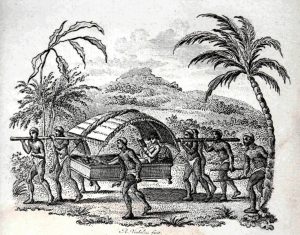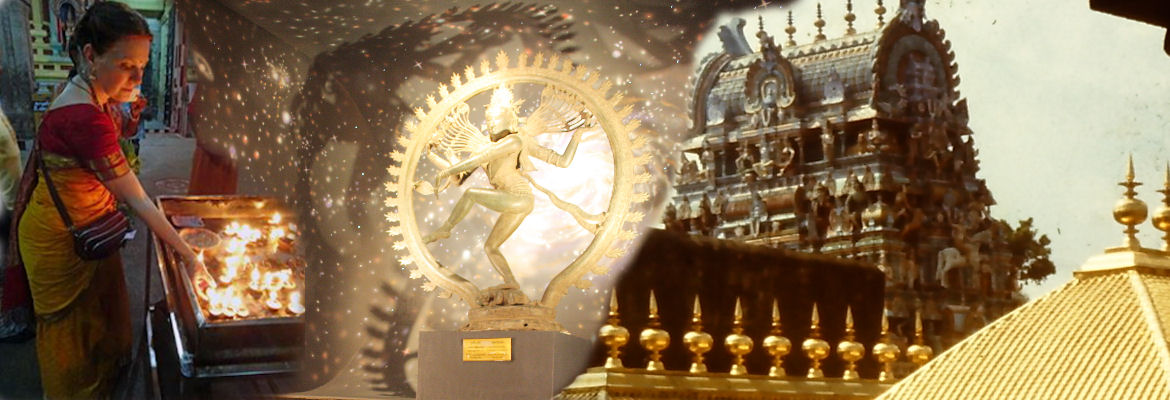Jacob Haafner was a Dutch VOC employee and traveller who lived and worked on the East coast of India for almost twenty years. After his return to Amsterdam he wrote a series of wonderful travelogues about his experiences. I am translating these into English (this is the first time) so all the world can enjoy his observations and insights. With this post start a series on his visit to ancient Mahabalipuram, or Mavelievarom, as he calls it. This chapter is part of his “Travels in a Palenquin” describing a journey from Bimilipatnam to Pondicherry in the years 1786 and 1788.
Talajoer. – Maveliewarom.

It was about three o’clock in the late afternoon when we departed from Tripalur, and a little before sundown we reached the fishermen village Talajur. It lies on the sea and had, amazingly, not suffered any damage as to the hutments; but the previous inhabitants of it, had all been killed, not one who had escaped the sword and the famine, and the few fishermen who now inhabited this village, belonged to another, located a few miles further north, which had been completely torched in the last war.
This was told to me by one of these unfortunates, while I sat on the beach and I entertained myself watching the rolling waves breaking against it. He spoke to me of his last village, about his cabin, his raft, about his nets, he had lost everything; of his wife and children, who had died of hunger; – he alone was left of his family – and he began to cry loudly.
His sad story moved me into the innermost parts of my soul; I thought of the terrible disasters that had struck the unfortunate natives of Choromandel; the horrendous scenes which I had seen and been present, played themselves again before my mind.
Fierce, gold-thirsty, cruel, treacherous foreigners come from distant lands, to spread war and destruction in these, previously blessed, nations, to sacrifice their inhabitants to sword and famine.
Great God! I cried wistfully, and folded my hands; when will peace and freedom smile again upon these innocent people? When will these gruesome tyrants once again be banished from this part of the world? How long will the poor Indian sacrifice his little resources to these insatiable robbers, and fatten them with his sweat and labor? How long, O merciful God! will they mark as their property the firstling of Nature and of the industry of the inhabitants?
While I was talking like this to myself, the sun sank behind the horizon, and gilded with her last rays still the white sand dunes. Darkness spread over the earth, and I returned to our camp, the heart filled with sad thoughts.
With the dawn we stepped again in our Palanquins. Not long after we saw the mountains of Maveliewarom, or Maveliepuram, ahead of us and around two o’clock in the afternoon we entered the valley and found ourselves nearly in the center of this large collection of miracles.
What an amazing scene for anyone who comes here for the first time! His contempt for the people of India can be ever so large and he can be heavily biased against them, but as soon as he has seen Maveliewarom, he will have to admit that these people must have had a high level of civilization. That the arts and sciences have previously experienced a flourishing and that everything we call miraculous as the pyramids of Egypt cannot be compared with the awe inspiring ruins and colossi that can be found in Maveliewarom and spread across India.
You can read the full chapter HERE

Ravi
A noble attempt Ms.Liesbeth to put forth by gone traces of great Indian Civilisation to light,best of luck to her
liesbethpankaja
Thank you so much, very happy to see all your appreciation. Haafner’s work deserves to be known in India.
Sreedevi
Jacob Haafner has recorded the lives of ordinary people and such first hand accounts are rare to come by. Thank you for translating this treasure.
Maran
Awesome! Looking forward for the next chapter. Thank You so much for the translation!
Bala
Very Nice Article.. Thanks for publishing…
Aravind
A good initiate. Expecting more episodes.
Keerthivarman sthpathy
It’s really remarkable,we (sthpathy) are very thankful, for your great work, once again thank you – keerthivarman sthpathy